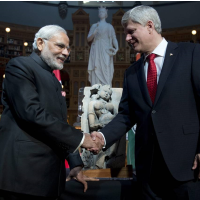Uranium from Canada to Boost Power Generation
 Prime Minister Narendra Modi shakes hands with his Canadian counterpart Stephen Harper (right) (photo: AP)
Prime Minister Narendra Modi shakes hands with his Canadian counterpart Stephen Harper (right) (photo: AP)
Canada has agreed a $280 million deal to supply uranium fuel to India, boosting Prime Minister Narendra Modi’s plan to increase nuclear capacity to meet growing energy demand. The agreement was signed in Ottawa during Modi's visit to Canada, formally ending a frosty dispute that began after New Delhi used Canadian technology to develop its first nuclear bomb.
Canadian producer Cameco Corp, the world's third-largest uranium producer, will supply 3.22 million kilos of uranium concentrate to India over the next five years. The uranium will be sourced from the company’s northern Saskatchewan mines, reports say.
"Canada is providing uranium to India as a mark of its trust and confidence in India," Modi told reporters.
He arrived in Canada on Tuesday, the first Indian prime minister to visit the country in more than four decades.
On May 18, 1974, India exploded an atomic bomb, leading Washington and Ottawa to ban the trade of nuclear materials with India.
The restrictions were eased only in 2008, after New Delhi reached a landmark nuclear deal with Washington, whereby India would continue its moratorium on tests and accept conditions set by the International Atomic Energy Agency (IAEA) to ensure imports would not be diverted to its weapons program.
According to the Globe and Mail, India and Canada began to put the dispute behind them with a cooperation deal in 2013 that let Canadian firms export nuclear materials and equipment to India, subject to IAEA safeguards.
"(That agreement) really allowed us to turn the page on what had been in our judgment an unnecessarily frosty relationship for far too long," Canadian Prime Minister Stephen Harper told a news conference.
India is one of the few major countries intent on expanding its nuclear generating capacity. Modi has made nuclear power a key element of his clean energy strategy.
The country needs foreign nuclear technology and fuel to ramp up capacity by a planned 14 times over the next two decades.
It plans to generate 63,000 MW of nuclear power by 2032 – from just 4,560 MW now. It has 22 nuclear reactors and plans to build some 40 more in the next two decades.
But India doesn’t produce nearly enough uranium to fuel its reactors and has been relying on Russia and Kazakhstan for its uranium supplies.
The two prime ministers also said they wanted to boost bilateral trade, which currently sits at a modest $5.2 billion a year, and revive stalled talks on a free trade agreement.
According to Reuters, 1.2 million Canadians – around 4 percent of the population – are of Indian origin, forming an important voting block in cities like Toronto and Vancouver.
Canada's ruling Conservatives – facing a tough election in October – have tried hard to build ties with the Indian community. Harper even appeared with Modi at the latter’s public events in Toronto and Vancouver.
- Karan Singh
To Learn More:
Canada, India agree to $350-million uranium supply deal (by Steven Chase and Kim Mackrael, The Globe and Mail)
Canada, India unveil uranium supply deal, bury nuclear discord (by David Ljunggren, Reuters)
Canada to sell uranium to India (BBC News)
India-Canada uranium supply deal to boost nuclear power generation (by Sanjay Jog, Business Standard)
Canada and India: The nuclear genie, 40 years on (The Globe and Mail)
- Top Stories
- Controversies
- Where is the Money Going?
- India and the World
- Appointments and Resignations
- Unusual News
- Latest News
- India College Chain’s Expansion into U.S. Draws Opposition from Massachusetts Officials over Quality of Education
- Milk Shortages in India Tied to Release of New Movies Featuring Nation’s Favorite Stars
- Confusion Swirls around Kashmir Newspaper Ban in Wake of Violent Street Protests
- Polio-Free for 5 Years, India Launches Vaccine Drive after Polio Strain Discovery
- New Aviation Policy Could Increase Service, Lower Ticket Prices






Comments